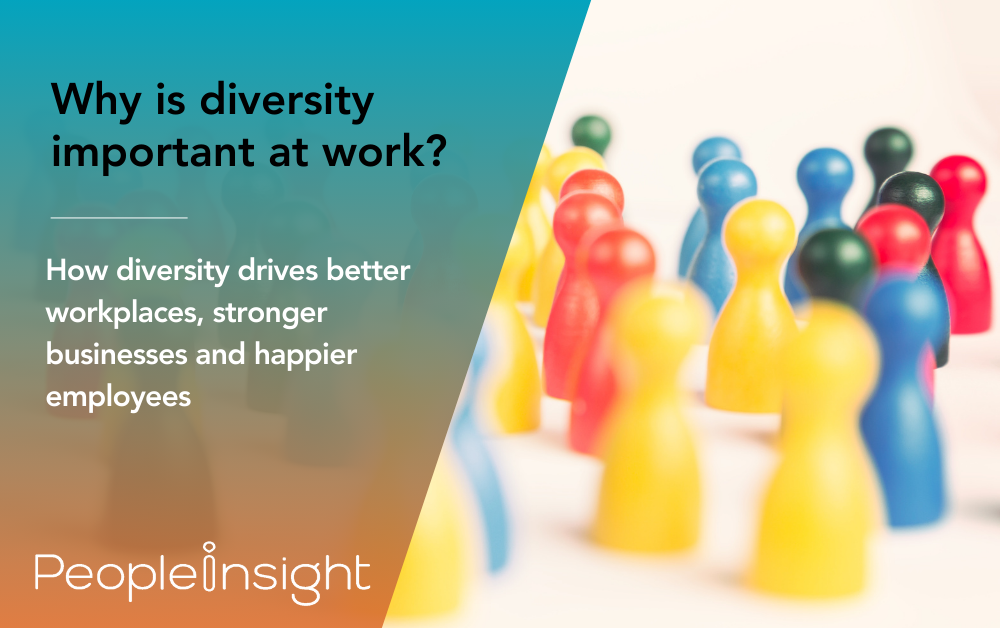
A quick insight: Diversity and inclusion strategies strengthen fairness, innovation, belonging and trust in the workplace. Let’s explore how inclusive practices support individuals and teams and why they are essential for a healthy organisational culture. This post shows how diversity and inclusion drive both human and business value when they are treated as core priorities.
When nearly a third of employees feel that their workplace doesn’t treat everyone equally, it’s clear there’s still a long way to go in creating truly inclusive workplaces.
Our benchmark data shows that 31% of employees don’t believe their company treats everyone fairly — an issue that goes beyond compliance and corporate policies.
Workplaces that embrace diversity aren’t just ticking a box. They benefit from a wider talent pool, increased employee engagement and fresh perspectives that drive innovation. But diversity alone isn’t enough. You need to create an environment where people feel they belong and can thrive. So why is diversity important at work? The answer goes far beyond representation — let’s explore.
Related: What’s the difference between equality, diversity and inclusion?
Diversity directly influences an organisation’s ability to innovate, attract top talent and achieve strong financial performance.
Below are five key reasons why diversity is so important at work.
A diverse workforce leads to better decision-making and increased innovation. Research shows that diverse teams make better business decisions up to 87% of the time. When people from different backgrounds and perspectives collaborate, they bring varied problem-solving approaches, reducing groupthink and blind spots in decision-making.
The link between diversity and innovation is also well-documented. Companies with diverse management teams see a 19% increase in revenue attributed to innovation. This is because diversity introduces fresh perspectives, encourages creative problem-solving and leads to the development of products and services that appeal to a wider customer base.
Diverse teams also approach problem-solving differently from homogeneous teams. By incorporating different viewpoints, they challenge assumptions and consider alternative perspectives, leading to more effective solutions. Research supports the idea that diversity leads to improved problem-solving, as teams with a mix of backgrounds, experiences and skills are more likely to identify creative solutions and navigate complex challenges.
Related: Download a sample of free diversity and inclusion survey questions
The ability to attract and retain top talent is a major challenge for many businesses. A diverse and inclusive workplace appeals to a broader talent pool, making recruitment easier and reducing turnover.
Surveys show that 76% of job seekers consider diversity an important factor when evaluating potential employers. Inclusive workplaces are also known to see up to 50% higher staff retention rates. Employees are more likely to stay with a company where they feel valued and included, reducing the costs associated with high turnover.
Read more: Diversity and inclusion in recruitment
The benefits of workplace diversity extend beyond company culture — there is a strong financial case for diversity. Companies in the top quartile for ethnic diversity are 35% more likely to outperform their industry peers financially. Gender diversity also plays a role, with businesses that have gender-diverse executive teams being 25% more likely to achieve above-average profitability.
Investors and stakeholders are increasingly recognising the connection between diversity and financial returns. Organisations that prioritise diversity equality and inclusion often gain a competitive edge in their industry.
A diverse workforce allows businesses to better understand and serve a wide customer base. When employees reflect the demographics of the communities they serve, they can offer insights that help organisations tailor products and services more effectively.
Diverse companies are 70% more likely to capture new markets, demonstrating how diversity can be a strategic advantage in expanding business opportunities. Companies that embrace different cultural perspectives are also better positioned to navigate global markets and avoid costly missteps in marketing and customer engagement.
Inclusive workplaces contribute to a sense of belonging among employees, leading to increased employee engagement. Employees who feel included are 83% more engaged at work, which translates to higher productivity and better overall performance.
Workplace inclusion also impacts mental health. Employees in inclusive environments report lower stress levels and higher job satisfaction, as they feel their voices are heard and their contributions are valued. Promoting an inclusive culture improves both individual wellbeing and overall workplace morale.
Despite the clear benefits of workplace diversity, many organisations face challenges when trying to improve it.
Some of the most common obstacles include:
Recognising and addressing these challenges is the start to overcoming them and building a truly diverse and inclusive workplace.
To create a more inclusive and diverse workforce, organisations should first make efforts to understand their current position. Measuring diversity it involves evaluating employee experiences, career progression and inclusion levels.
Here are a few effective ways to measure workplace diversity:
Understanding why diversity is important is the first step towards building a workplace where everyone feels valued. Organisations that prioritise diversity and inclusion see benefits ranging from increased innovation to improved financial performance and higher employee engagement.
One of the most effective ways to measure progress is through employee listening initiatives, such as diversity and inclusion surveys. These surveys provide valuable insights into employees’ experiences and help identify areas where improvements can be made.
If your organisation is looking to become more inclusive, a dedicated diversity and inclusion survey can help uncover meaningful data and drive positive change. Contact us today to learn more about our D&I surveys and how they can support your organisation.

